Imperial echoes .. holding onto your brains in the UK, US, and Ontario (and Australia too)
May 7th, 2006 | By Randall White | Category: Key Current Issues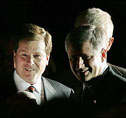 SUNDAY, MAY 7, 2006. Canada does not pay as much attention to the United Kingdom as it used to. But lately you might almost think that, inadvertently or otherwise, the new Conservative minority government in Ottawa has brought a few fresh Imperial Echoes of days that used to be long gone by.
SUNDAY, MAY 7, 2006. Canada does not pay as much attention to the United Kingdom as it used to. But lately you might almost think that, inadvertently or otherwise, the new Conservative minority government in Ottawa has brought a few fresh Imperial Echoes of days that used to be long gone by.
Even in Canada, e.g., Tony Blair’s “major cabinet reshuffle” in the United Kingdom this past week drew fresh attention to the recurrently baffling question of just why even the British “new Labour” party ever got mixed up in George W. Bush’s Iraq War.
Moving into today’s imperial heartland, on Thursday, May 4 the Los Angeles Times published “Iraq: Get out now,” by “Lt. Gen. William E. Odom (Ret.)” – a short version of an essay from the latest issue of Foreign Policy magazine in the United States.
 Meanwhile, the press of anglophone central Canada has been aggressively spilling ink over what is at least partly an anachronistic conflict about faded Canadian internal empires, between the Conservative Prime Minister of Canada from Alberta and the Liberal Premier of Ontario.
Meanwhile, the press of anglophone central Canada has been aggressively spilling ink over what is at least partly an anachronistic conflict about faded Canadian internal empires, between the Conservative Prime Minister of Canada from Alberta and the Liberal Premier of Ontario.
To wrap it all up, this past Friday two commentators from the Land of Oz published provocative intelligence on the future of international migration, for old and new empires everywhere. “Hold onto your brains” seems good advice for Spring 2006 in the global village.
Machiavellian maneuvers in the sceptered isle …
 The almost animal vigour of current British political debate is reflected even in headlines from The Times in London: “Blair turns butcher after poll carnage … Brown rivals win promotion in ruthless Cabinet reshuffle … Tories on march as Labour voters desert Prime Minister.”
The almost animal vigour of current British political debate is reflected even in headlines from The Times in London: “Blair turns butcher after poll carnage … Brown rivals win promotion in ruthless Cabinet reshuffle … Tories on march as Labour voters desert Prime Minister.”
The main driving force here was English local elections in which, nation-wide, Labour took only 26% of the vote – compared with 27% for the Liberal Democrats and 40% for the Conservatives.
This municipal democratic action, as Canadians might say, had no direct effect on Prime Minister Tony Blair’s current Labour government in the UK Mother of Parliaments. Except that it did prompt a “ruthless Cabinet reshuffle” (or just shuffle in North American English), to reassert Prime Minister Blair’s authority over his government.
In some degree, at any rate, the current clash between the Blair and (presumed leadership successor Gordon) Brown factions of the governing Labour party in the UK is bound to remind Canadians of the clash between the Chretien and Martin factions in the former governing Liberal Party of Canada. And the strong vote won by the UK Conservatives in the English local elections will no doubt be read by Canadian Conservatives as good news for the new Conservative minority prime minister of Canada, Stephen Harper.
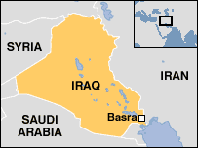 For Canadians there is something eerie as well in the news that “Labour’s drubbing at the polls came after weeks of relentlessly negative headlines over a series of government scandals.” But other news this weekend, about Iraqis cheering the crash of a British helicopter near Basra, was a reminder that the Blair government’s current unpopularity also has a lot to do with the increasingly unpopular War in Iraq, in which London and Washington are so entangled.
For Canadians there is something eerie as well in the news that “Labour’s drubbing at the polls came after weeks of relentlessly negative headlines over a series of government scandals.” But other news this weekend, about Iraqis cheering the crash of a British helicopter near Basra, was a reminder that the Blair government’s current unpopularity also has a lot to do with the increasingly unpopular War in Iraq, in which London and Washington are so entangled.
A US Associated Press report on Tony Blair’s ruthless cabinet shuffle stressed that: “A group of Labour lawmakers were drafting a letter urging Blair to outline a firm and fixed timetable’ for an early departure from office.” (Mmmm … again … remember when some Canadian Liberal supporters of Paul Martin were urging something similar on Jean Chretien?)
Rising new “Get out of Iraq now” mood in USA today?
 One virtue of British parliamentary as opposed to US presidential-congressional democracy is that you actually can rather quickly get rid of an increasingly unpopular prime minister – in a way that you cannot quickly get rid of an increasingly unpopular president. But can an increasingly vigorous US public opinion nonetheless prompt a passionately stubborn president to change an unpopular (and certainly unwise) policy?
One virtue of British parliamentary as opposed to US presidential-congressional democracy is that you actually can rather quickly get rid of an increasingly unpopular prime minister – in a way that you cannot quickly get rid of an increasingly unpopular president. But can an increasingly vigorous US public opinion nonetheless prompt a passionately stubborn president to change an unpopular (and certainly unwise) policy?
The most striking feature of General Odom‘s case for just getting out of Iraq now is probably the sensible and down-to-earth way in which he answers the George W. Bush administration’s “most popular arguments for not leaving Iraq … If we leave, there will be a civil war …Withdrawal will encourage the terrorists … Before U.S. forces stand down, Iraqi security forces must stand up … Setting a withdrawal deadline will damage the morale of U.S. troops …Withdrawal would undermine U.S. credibility in the world.”
 After giving very good short rebuttals of these arguments, the shorter version of General Odom’s Foreign Policy essay in the Los Angeles Times concludes with such final thoughts as: “Only with a rapid withdrawal from Iraq will Washington regain diplomatic and military mobility. Tied down like Gulliver in the sands of Mesopotamia, we simply cannot attract the diplomatic and military cooperation necessary to win the real battle against terror … In fact, getting out now may be our only chance to set things right in Iraq.”
After giving very good short rebuttals of these arguments, the shorter version of General Odom’s Foreign Policy essay in the Los Angeles Times concludes with such final thoughts as: “Only with a rapid withdrawal from Iraq will Washington regain diplomatic and military mobility. Tied down like Gulliver in the sands of Mesopotamia, we simply cannot attract the diplomatic and military cooperation necessary to win the real battle against terror … In fact, getting out now may be our only chance to set things right in Iraq.”
It no doubt remains very hard to see how George W. Bush will ever be able to bend his stubborn mind and past declarations of indomitable political will around such ultimate conclusions. But stranger things have happened in the history of the world. And it is at least encouraging to see such palpable common sense in the pages of the Los Angeles Times.
Ontario after the Age of Compliance …
 Meanwhile, back in Canada itself (you might feel obliged to agree), so many people outside the most populous province of Ontario seem to believe that Ontario has traditionally exercised some kind of imperial domination over the rest of Canada that there must be at least some slight grain of truth to the concept.
Meanwhile, back in Canada itself (you might feel obliged to agree), so many people outside the most populous province of Ontario seem to believe that Ontario has traditionally exercised some kind of imperial domination over the rest of Canada that there must be at least some slight grain of truth to the concept.
Insofar as there is or may be, however, it has or had a lot more to do with the political and economic structure of the Canadian confederation in the third quarter of the 20th century – from about 1950 to about 1975 – than it has with anything going on or likely to go on in the first quarter of the 21st century.
Ontario’s current Liberal Premier Dalton McGuinty has been trying for a while to point this out to anyone who will listen. But at the moment it seems that Canada’s new Conservative Prime Minister Stephen Harper is not really any more prepared to be among the listeners than the old Liberal Prime Minister Paul Martin.
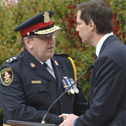 As Mr. McGunity has lately put it, what Canadian federal governments have traditionally demanded from Ontario provincial governments in the twisted world of federal-provincial relations is “compliance.”
As Mr. McGunity has lately put it, what Canadian federal governments have traditionally demanded from Ontario provincial governments in the twisted world of federal-provincial relations is “compliance.”
Ottawa, the theory has gone, has so many other regional interests to accommodate that the interests of the biggest province must just be checked in at the door. And in any case Ontario’s regional interests are already looked after very well, thank you, in the political and economic structure of Canada at large.
Yet things have changed a lot in Canada since the old national golden age of 19501975 – even if many old and new Ottawa minds are still trapped back there. And Stephen Harper’s proposed new concept of “open federalism” apparently aspires to change things even more. Whatever may or may not have been true about the past, the political and economic structure of Canada at large no longer gives Ontario special advantages. And what Stephen Harper seems to have in mind will give it even less.
 So, Premier McGuinty is saying, Ontario in its own interests can no longer afford to be as compliant as it may have been in the past. Ontario provincial Conservative leader John Tory may think he was somehow being statesman-like this past week, when he “criticized Mr. McGuinty for seeming bent on picking a fight with the rest of Canada.'” But if Mr. Tory actually does become what Mr. Harper has called “the next premier of Ontario,” he will likely enough find himself in a similar position to Mr. McGuinty today. (Just ask Mike Harris.)
So, Premier McGuinty is saying, Ontario in its own interests can no longer afford to be as compliant as it may have been in the past. Ontario provincial Conservative leader John Tory may think he was somehow being statesman-like this past week, when he “criticized Mr. McGuinty for seeming bent on picking a fight with the rest of Canada.'” But if Mr. Tory actually does become what Mr. Harper has called “the next premier of Ontario,” he will likely enough find himself in a similar position to Mr. McGuinty today. (Just ask Mike Harris.)
For all his intelligence and cleverness, Mr. Harper himself still seems to think that it is a rule of the Canadian game that Ontario always has to be compliant – regardless of how all the other rules change. But say whatever else you like this finally just does not make sense. And even in Canada things that do not make sense cannot last forever. If it’s going to be “open federalism,” it has to be open for Ontario too – the home region for almost 40% of all Canadians (large numbers of whom are as disadvantaged and struggling as anyone anywhere else in the country).
Immigration in the Land of Oz (and beyond) …
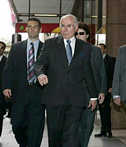 The Brisbane Courier Mail for May 5, 2006 included an intriguing piece by Greg Barns and Howard Glenn, looking at “this week’s decision to limit the skilled migrant intake for 200607” in Australia. You have to subscribe or otherwise pay for the full text. But a few sample paragraphs are provocative enough:
The Brisbane Courier Mail for May 5, 2006 included an intriguing piece by Greg Barns and Howard Glenn, looking at “this week’s decision to limit the skilled migrant intake for 200607” in Australia. You have to subscribe or otherwise pay for the full text. But a few sample paragraphs are provocative enough:
“THE tragedy of the debate about immigration in Australia today, such as it is, is that politicians from all sides pander to fear and prejudice, rather than preparing the community for a very different reality.
“The Howard Government this week limited the skilled migrant intake to only 97,500 for 2006-07, despite the demand being far higher. Why? Because the Government is worried that the ALP and union movement’s protectionist threats about not allowing migrants to take Australian jobs may be having an electoral impact.
“But there are two reasons why the policy settings of the Coalition and the ALP on the matter of migration are the stuff of fantasyland.
“First, the reality of the 21st century will be that, as the US and Western Europe are already discovering, the ageing and declining populations of developed countries increasingly will have to turn to developing world migrants to fuel their economic growth, with millions of such migrants ready to move to contribute to their new homeland.
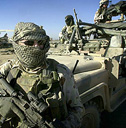 “Secondly, as a solution to world poverty, remittance money sent back home by migrants from poor countries is a much more efficient way of alleviating poverty than state-run aid programs.
“Secondly, as a solution to world poverty, remittance money sent back home by migrants from poor countries is a much more efficient way of alleviating poverty than state-run aid programs.
” … The difficulty in explaining such realities to many Australians is that it requires asking them to comprehend that the Australia their children and grandchildren live in may be culturally and economically different to that which exists today. These migrants mostly won’t be European Christians, which is why there is likely to be a confrontation with public fears.
“But there is no point in politicians burying their heads in the sand and making decisions in this area of public policy based on short-term political considerations.
“How the 21st century measures up in terms of prosperity for countries such as Australia will depend in large part on the capacity to accept large-scale skilled short and long-term migration from developing countries.”
POSTSCRIPT: “IMPERIAL ECHOES” – Remembering the old BBC and CBC theme music, composed by Arnold Safroni Middleton … (with thanks and apologies to the Royal Army Pay Corps Association).
 Arnold Safroni was the pseudonym for Arnold Safroni Middleton a novelist, composer and dramatist. He was born in the county of Kent England in 1873. He studied violin at an early age and became the concert master of the orchestra at Her Majesty’s Theatre in Sydney, Australia. He also performed with the Carl Rosa Opera orchestra in London.
Arnold Safroni was the pseudonym for Arnold Safroni Middleton a novelist, composer and dramatist. He was born in the county of Kent England in 1873. He studied violin at an early age and became the concert master of the orchestra at Her Majesty’s Theatre in Sydney, Australia. He also performed with the Carl Rosa Opera orchestra in London.
Most of Safroni Middleton’s music was composed between 1900 and 1920, and published by Boosey and Hawkes. His compositions, with the exception of “Imperial Echoes,” have long since faded from the orchestral repertoire. But some of his music has been performed by the Palm Court orchestra on their many CDs. (He also wrote a number of salon pieces for small orchestra.) His marches include “Light Regiment,” “Salute the Standard,” and “The Scottish Chief.”
“Imperial Echoes” was first published in 1913 but remained virtually unknown for 30 years. Then, during the Second World War the BBC was looking for a signature tune for its daily “NEWSREEL” feature. After due consideration “Imperial Echoes” was selected. It soon became a rallying sound, and people all over England were whistling the strains of this popular march.
It was so popular that when the Canadian Broadcasting System began its inaugural TV broadcasts in 1953 the theme was once again used in connection with the nightly news in Canada. “Imperial Echoes” today remains one of the most popular marches in the British military band repertoire. It was the regimental quick march of the Royal Army Pay Corps until 1992.
In the early 21st century you can hear a full rendition of the march on You Tube.

